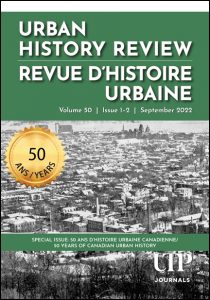Written by guest blogger Nicolas Kenny.
The Urban History Review – Revue d’histoire urbaine has always had a special place in my heart. It was the venue for my first scholarly article two decades ago, and I’ve always enjoyed keeping up with the insightful work it produces on urban history in Canada and beyond. A year after joining Harold Bérubé as co-editor, it’s an honour to publish our 50th anniversary issue. Our thanks go to Richard Harris for proposing the round table discussion at the heart of this special issue. Initially intended as a 2020 CHA panel, the discussion among cutting edge urban historians was pushed online, and we’re glad now to share their thoughts on the state of the field.
In 1972, a group of scholars referring to themselves as “urbanologists” and excited about the interpretive possibilities of studying the history of Canada’s cities, set out, somewhat cautiously, to create “something more than a newsletter, but something less than a learned journal.”[1] The UHR-RHU started out by publishing an assortment of short urban portraits, review essays, and methodological reflections. This was a moment of considerable effervescence in the growing field, in Canada and around the world, as evidenced by the creation of the British Urban History Yearbook (now Urban History) and the American Journal of Urban History two years later.
It didn’t take long for the UHR-RHU to surpass these modest ambitions and become a leading specialised journal, publishing full-length scholarly articles. Five decades on, though, Harris’s provocative contribution to the anniversary edition is decidedly sullen. He deplores the “parlous condition” in which he sees the field, noting the death of conferences and publications of national scope as compared to the “golden age” of the 1970s and 1980s and even to the current situation in the UK and USA.
Although Phillip Gordon Mackintosh regrets the decline of urban historical geography curricula in university classrooms, others offer more hopeful takes in their contributions. Taking stock of urban history in Quebec since the 1960s, UHR-RHU co-editor Harold Bérubé sees urban history as being in “relatively” good condition and calls for greater interdisciplinarity in our approaches. Indeed, contributions by Jennifer Bonnell and Sean Kheraj, Michèle Dagenais, and Matthieu Caron note the innovative work that’s done when urban history is viewed through the lenses of environment, sexuality, or Indigenous studies. For her part, Tracy Neumann invites scholars in this country to work towards situating Canadian cities within a global urban historical framework and to advance the work of decolonising approaches to the urban past.
The issue comes full circle with concluding remarks by Harris, who emerges from this dialogue with the sense that the state of research is perhaps less worrisome than he had originally posited. Despite smatterings of inevitable existential doubt about the field, the authors gathered in the round table discussion clearly show the abundance of ways in which our thinking about cities and their pasts continues to evolve. Aware of the rich diversity of publication venues available to scholars, we hope they will keep thinking of this journal as the place where questions about the urban past connect to a host of larger political, social, cultural, economic, and environmental considerations. Here’s to the next fifty years!
About the Author
 Nicolas Kenny is a member of the Department of History at Simon Fraser University. His research focuses on sensorial and emotional experiences of urban environments in times of significant transformations, including industrial modernity and war. He is the author of The Feel of the City: Experiences of Urban Transformation (University of Toronto Press, 2014) and of Bruxelles et sa radio : Émotions et sonorités, 1923-1960 (CFC Éditions, 2019). With Rebecca Madgin, he co-edited Cities Beyond Borders: Comparative and Transnational Approaches to Urban History (Ashgate/Routledge, 2015).
Nicolas Kenny is a member of the Department of History at Simon Fraser University. His research focuses on sensorial and emotional experiences of urban environments in times of significant transformations, including industrial modernity and war. He is the author of The Feel of the City: Experiences of Urban Transformation (University of Toronto Press, 2014) and of Bruxelles et sa radio : Émotions et sonorités, 1923-1960 (CFC Éditions, 2019). With Rebecca Madgin, he co-edited Cities Beyond Borders: Comparative and Transnational Approaches to Urban History (Ashgate/Routledge, 2015).
[1] John H. Taylor, “A Preface,” Urban History Review, 1 (1972), 1.

Comments on this entry are closed.